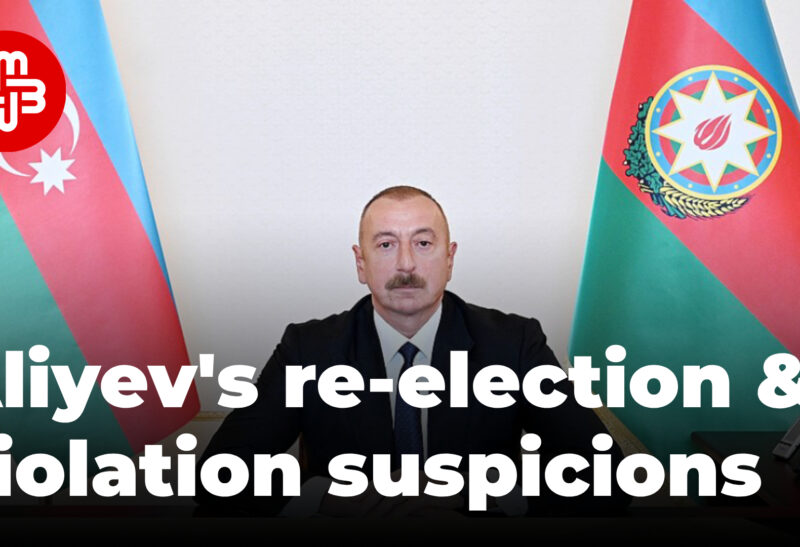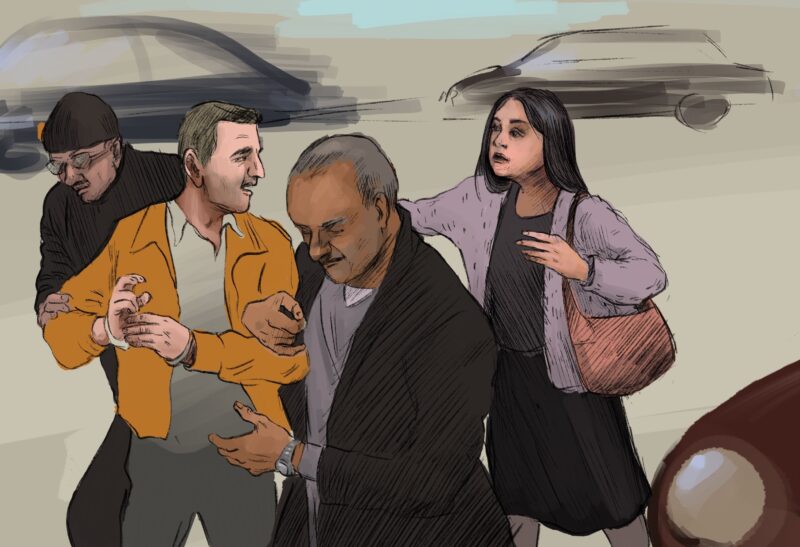How the pandemic served as the “inspiration” for the creation of the first Azerbaijani children’s theater in Georgia
The city of Gardabani is located 39 km south of Tbilisi and populated mostly by ethnic Azerbaijanis. It is here that BeeZ was founded, the first and for now the only Azerbaijani children’s theater in Georgia.
The founder and artistic director of the theater is the young actor Binali Islamoghlu. He set it up in his own courtyard, in a small outbuilding that has been around since he was a child, because the troupe does not yet have a permanent home or its own stage.

Upon entering the private courtyard, you can’t miss the outbuilding just to the right of the gate. When you push open the glass door, you find yourself in a small room. In one corner stands a piano, and in another a makeshift stage has been set up. This is also where all the sets are stored. One set along the wall is reminiscent of a forest. Another integral part of the theater is the wood-burning stove used to heat the outbuilding in the winter.
“Before the children come, I make a fire in the stove so they won’t get cold during rehearsal,” explains Islamoghlu. “I collect firewood right in the city. Wherever I find a bit of wood or cardboard, I pick it up.”
His day begins at eight o’clock when he sets out in search of firewood – he collects cardboard boxes and wooden crates left outside of shops. So as not to disrupt his little actors’ schoolwork, he usually schedules rehearsals on weekends, at two or four o’clock in the afternoon. The children who live too far from the theater to walk there get rides from friends or parents.

During our conversation, the children crowded into a corner of this “chamber theater,” and it seemed that there was a strong connection between these children of various ages and their teacher.
From big to small stage
In 2005, Islamoghlu began to work at the Tbilisi state Azerbaijani drama theater, in 2006 he started one of the theater’s newly opened courses, and after graduating, he became a member of the theater’s acting troupe: “There were a lot of students in the course, but I was one of the few who graduated. From 2006 to 2019 I worked with amazing directors and I learned a lot from them. But unfortunately, I was fired in 2020 by the theater’s new artistic director. You know, to be without a job in 2020, at the very height of the pandemic… And I was the only person in my family who worked.”
But his firing at the height of the pandemic did not discourage Islamoghlu from pursuing his craft. On the contrary, he became even more socially active.
“Some close friends found me a job in Gardabani. I had a lot of free time, and we decided to shoot a film about social issues here. Eventually that turned into the short film called ‘The Mayor.’ The film was received very well and the social issues that it discussed were soon resolved. Apart from that, I noticed that Islam, the four-year-old boy who starred in the film, showed some real acting talent. And I thought, maybe there are other talented kids here.”
This observation was the impetus for founding the BeeZ studio and recruiting gifted children: “Then we decided to put these children on stage. That’s how in 2021 the BeeZ independent theater was born.”

As soon as it was created, BeeZ became famous, winning a competition organized by the Georgian Culture Ministry. Islamoghlu says that the ministry also supported the project “Integration on Stage”:
“We put on a show based on ‘The Forest Comedy,’ a play by the classic Georgian writer Vazha Pshavela. The show was a huge success. The premiere was attended by representatives of the Georgian Culture Ministry, the Azerbaijani embassy, and the regional municipality, and even by the mayor himself. We received a lot of encouragement. Then we went on a tour of the regions – we put on our show at the houses of culture in Bolnisi, Marneuli, Rustavi, and Gardabani.”
But that was not all that the theater did – “The Forest Comedy” was translated in Azerbaijani and distributed to schools free of charge.
A clever solution to the theater’s financial problems
The little outbuilding in Islamoghlu’s courtyard became a center of culture for the children. According to Islamoghlu, he was forced to use his own home for the theater due to financial difficulties:
“You need money to rent a space. I grew up in this little ‘home theater.’ When I was four, my aunt gave me a naghara [a traditional Azerbaijani drum – ed.]. I guess that’s how I started honing my skills. I was the best naghara player in our region. And I thought, why not set everything up right in our home?”
Most of the sets were bought with the support of the Georgian Culture Ministry, but some were bought by the theater’s staff with their own money.

At the moment, fourteen children from various age groups are learning the intricacies of the acting profession in this cold, crowded little room. The youngest is six and attends kindergarten. The oldest is 13. The children who perform in shows are mostly in the first, third, and sixth grades. Islamoghlu says that the number of children under his tutelage is constantly growing:
“Parents really want their children to take part in our theater. Where does that desire come from? After our last show they noticed a lot of activity among the children. Our goal is to impart to the kids the culture of the theater and artistic taste. To impart to them a love for music and books. Our kids are different than their peers. For casting we organize acting classes and look to see which children show interest, and who has talent and the inclination.”
According to Islamoghlu, the interest around the theater is growing day by day and this is partly thanks to the short videos they shoot with the children and post to social media.

Islamoghlu complains that they would like to organize various other activities for the children, but their lack of funds holds them back:
“We’d like to introduce the children to Azerbaijani and Georgian music. Or teach them drawing – we have professional artists. Or teach them Georgian and Azerbaijani folk dancing. But all of that requires financial investment, so we can’t realize a lot of our ideas. At the moment, we only have the theater courses, and we don’t take any money for them from the children, they’re free“.
According to Islamoghlu, they have not approached anyone regarding their financial difficulties, but they would be willing to work with donor organizations.
“Our goal is to prepare the kids for life by bringing them up in the culture of the theater,” says Islamoghlu. “That way they’ll be able to find their way in life. We hold meetings with parents and try to explain that to them. That the children have to be taught, they have to be given a good education. Of course, it all begins with the theater – we sort of sand down their rough edges and then hand them over to their parents, so that they in turn can provide the kids with an education.”

“In cold weather rehearsals happen at home”
“Sometimes the kids come from school and show up hungry at rehearsal,” says Islamoghlu. “We feed them here. When it rains, sometimes I go a child’s house, so that they don’t get soaked in the rain. We don’t want them to have any grudge against the theater. In bad weather I come to them at their homes so as not to miss rehearsals.”
He says that he dreams of raising the children’s theater to a higher level and, although he has been able to overcome a lot of obstacles in his path, he still needs help and support:
“We don’t have gas here. If SOCAR [the State Oil Company of the Azerbaijan Republic, which supplies most of Georgia’s natural gas – ed.] would provide us with a small amount, we could heat the outbuilding with a gas heater. And if we go over the limit, we would pay the difference. If we had that kind of support, we could hold classes in the winter, too. Right now we had to stop rehearsing because of the cold weather. Our stove is useless when it’s this cold. We’ll start rehearsals again at the end of February.”

But the actor’s dreams are not limited to the theater – he plans to offer drawing classes and lessons for piano and even the chonguri [a Georgian 4-stringed musical instrument – ed.].
A group of children has gathered in the corner and is listening to their teacher. One of them, a girl named Zokhra, says that she is very glad to be involved with the theater: “I like getting on stage and going on tour. And I like being here with the other kids.”
– Aytan Farhadova
Produced with the support of the Russian Language News Exchange.



